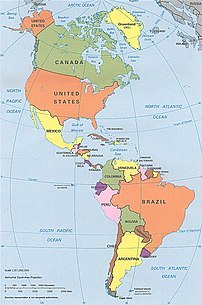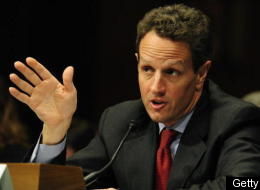 Image by DanTheWebmaster via Flickr
Image by DanTheWebmaster via Flickr
Moving on....
Tonight, I am departing from my own self-imposed restrictions. Normally, I don't speak about Jamaica. Tonight I will because the situation warrants it.
If you live here, you know we - like many other countries- are facing a tax package. I understand why we have to have one. I accept that not all people can be happy. But there are two particular inclusions that I feel compelled to comment on. Now, for the record, I could comment on ones that materially affect my life - because there are those. But, as usual, my interest is the national interest.
The GOJ has decided to charge GCT on books and computers. I have tried and tried and tried and cannot rationalize this:
- First, the GOJ and the Opposition (when the roles were reversed) by way of a special parliamentary agreement made specific commitments to education. The whole nation accepts that development of human capital must be the highest priority given the benefits for social stability, employment, growth etc etc. The PM himself reminded us all today in his budget presentation to just accept that the current education system is not producing the desired results and that it must continue to be prioritized and reformed. So why tax the very tools - books and computers - that promote and nourish education and the development of human capital? I accept that schools can get them without the tax, but don't students have homework? So, is it that we don't use books and computers for educational purposes outside of school? Reading a classic novel that is not on the book list is not educational? And if we do not, then is it not perhaps part of the problem? Do we not want to provide our people with the maximum access to those tools that will help them to be able to compete successfully with the best and brightest anywhere in the world?
- Second, tax policy exists to 1) increase revenue 2) encourage certain activity 3) discourage certain activity. The matter of equity is a separate issue. In this case, computers and books do not provide a massive amount of revenue. If it were something like, say cars, I could see how this would be a harder decision. But, in my very humble view, cars only get you from A to B, they do not develop the human potential. Certainly the possible revenue that could be generated is not enough to negate the potential costs of idleness when people - children, youth and adults - who could have been using computers and could have been reading books instead get into crime. So, let's forget the revenue argument for a moment. Moving on to encouraging and discouraging activity - in this case, an increase is likely to be translated into a real disincentive to purchasing computers and books. Why? Because real disposable income is declining at an increasing rate - depreciation, inflation, the pending JPS increase, the expected recovery of oil prices, the gas tax and pass through effects etc etc. A computer is already a big ticket item for many of the people for whom the policy would wish to have and use it most. I am having a difficult time understanding how a 16.5% tax will not materially dampen demand when I am aware of some of the other serious sacrifices that people are already making.
- Third, like all other countries, we are having job losses. Job losses are going to continue. Companies and people (even those employed) must re-tool to stay competitive. I commend the PM for all the initiatives for MSME's and entrepreneurship. But I must ask. How does one start any kind of sustainable venture without a computer? How does one develop a competitive advantage in this very open economy that globalization has brought without a computer? If I heard him correctly, the PM correctly noted the lack of access to financing that most people have. Increasing the cost of a computer and reading material just means that they are likely to be unfairly sacrificed for other needs. What about all of the immense opportunities, especially for the younger generation, in computer, IT and new media industries. These are viable opportunities in an era when the PM himself has so correctly highlighted the need to provide the younger people with hope and a real chance. It is true that most small businesses are extremely challenged to survive - yes, they fail. But, they are even more likely to fail without a computer, or if they have to take on the additional costs of computers. As for books and reading material not deemed educational, what will nurture creativity other than books? What about reading about trends and global market needs in publications and periodicals?
- Finally, is it really even possible to guarantee collection of these taxes? So, for the price we are likely to pay on the impact on development, is the revenue potential - which is relatively minimal - really going to be realized? And will that potential not be dampened by the significant likelihood that demand will be depressed?



![Reblog this post [with Zemanta]](http://img.zemanta.com/reblog_e.png?x-id=b69408df-4ffc-43ba-ac02-8b8f2bb8b015)


![Reblog this post [with Zemanta]](http://img.zemanta.com/reblog_e.png?x-id=27379592-1ecf-41f9-99d9-e34c7ffaed79)

![Reblog this post [with Zemanta]](http://img.zemanta.com/reblog_e.png?x-id=6073bbd2-cab8-49ad-9778-4f0eceaa4e24)

![Reblog this post [with Zemanta]](http://img.zemanta.com/reblog_e.png?x-id=78fd97cc-347d-4124-bbbb-5ce070ee45e3)

![Reblog this post [with Zemanta]](http://img.zemanta.com/reblog_e.png?x-id=83e15d13-f7f9-4f41-bcb8-8b9824d0fe44)

![Reblog this post [with Zemanta]](http://img.zemanta.com/reblog_e.png?x-id=278d1c3c-f902-46b5-8126-d413a72a2bd2)

![Reblog this post [with Zemanta]](http://img.zemanta.com/reblog_e.png?x-id=2f220fbb-35c9-4f34-a3bf-89a80312cdd2)

![Reblog this post [with Zemanta]](http://img.zemanta.com/reblog_e.png?x-id=3a2998e4-2ea5-40f0-a4ec-364193ad0444)

![Reblog this post [with Zemanta]](http://img.zemanta.com/reblog_e.png?x-id=df13a7d5-af16-4725-be62-193bed0ca621)

![Reblog this post [with Zemanta]](http://img.zemanta.com/reblog_e.png?x-id=6b2e9123-c8e0-4eb4-9d3f-3ff438dce7ed)
![Reblog this post [with Zemanta]](http://img.zemanta.com/reblog_e.png?x-id=b2e2690b-acc4-4f87-9277-fc688bf0f93e)

![Reblog this post [with Zemanta]](http://img.zemanta.com/reblog_e.png?x-id=a2e87bf9-5639-4c78-81da-b8eb00ff1c70)

![Reblog this post [with Zemanta]](http://img.zemanta.com/reblog_e.png?x-id=52ea0f7c-01f2-46c7-adba-ac81f23cb3f9)

![Reblog this post [with Zemanta]](http://img.zemanta.com/reblog_e.png?x-id=d6e3eb43-7e0e-4ee1-beed-0dcee102b373)

![Reblog this post [with Zemanta]](http://img.zemanta.com/reblog_e.png?x-id=77d5b7ff-3aff-4c23-b112-50d68c5152e7)








